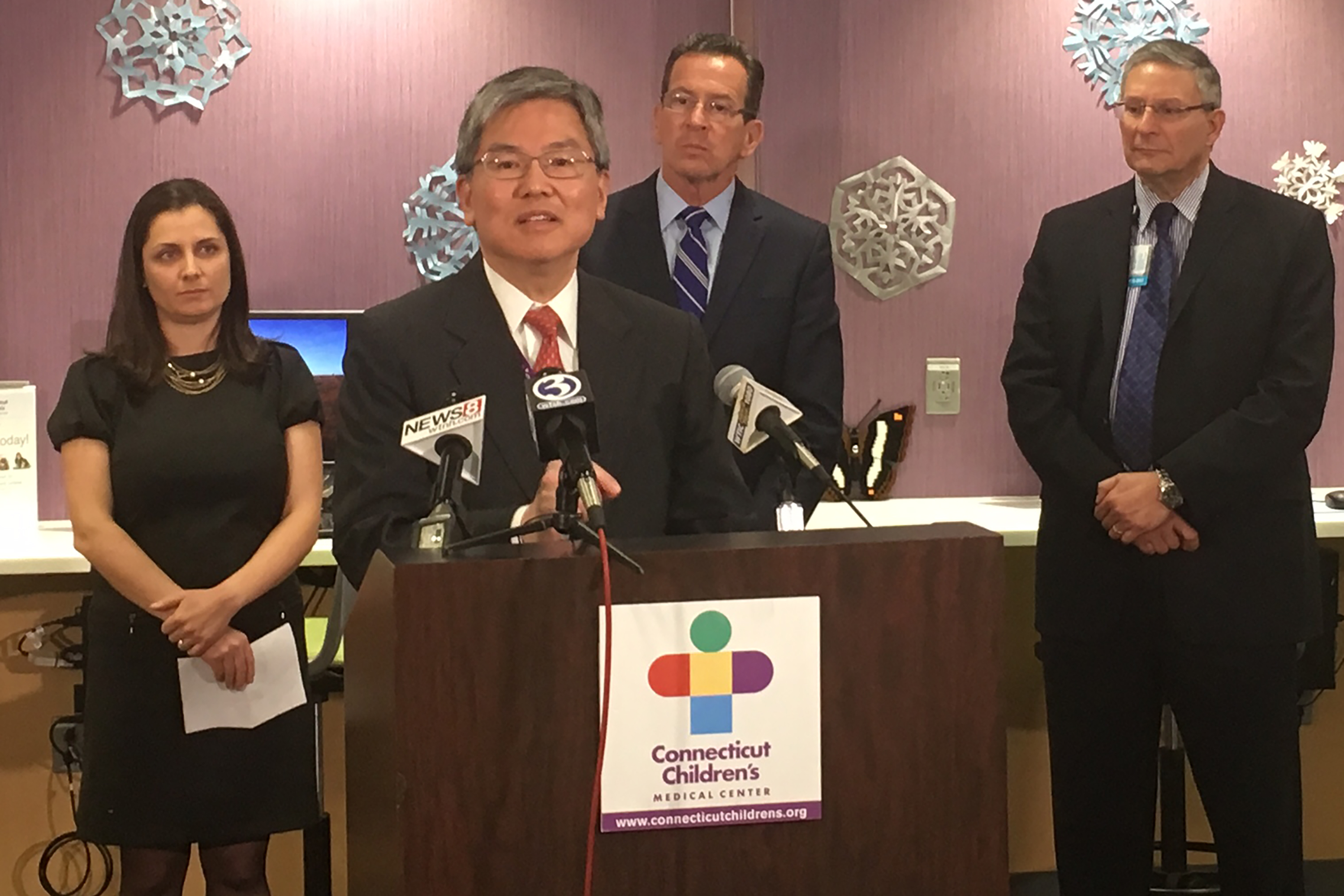Dr. Ching Lau, a leading pediatric cancer researcher at UConn School of Medicine, Connecticut Children’s Medical Center, and The Jackson Laboratory, is seeking the public’s help in finding new effective treatments for childhood cancers.
Along with a team of international researchers and IBM, Lau is actively searching for the right drug compound that could affect key molecules and proteins that control cancer cells in several common childhood cancers. Finding drug candidates can be an expensive and slow process.
To accelerate the pace, IBM is providing scientists with free access to World Community Grid, an IBM-funded and managed program which advances scientific research by harnessing computing power “donated” by volunteers around the globe. This resource is the equivalent of a free, virtual supercomputer that enables scientists to more quickly conduct millions of virtual experiments to help pinpoint promising drug candidates for further study.
 Lau, who is spearheading the international crowdsourcing research for the U.S. in collaboration with Connecticut’s Gov. Dannel Malloy and IBM, is asking for the public’s help in finding prospective treatments for childhood cancers, the top cause of death by disease for children. In Connecticut, more than 100 new cases of pediatric cancers are diagnosed each year.
Lau, who is spearheading the international crowdsourcing research for the U.S. in collaboration with Connecticut’s Gov. Dannel Malloy and IBM, is asking for the public’s help in finding prospective treatments for childhood cancers, the top cause of death by disease for children. In Connecticut, more than 100 new cases of pediatric cancers are diagnosed each year.
Volunteers don’t provide any time, money, or technical expertise to assist with this research project, called ‘Smash Childhood Cancer.’ Instead, they participate by joining World Community Grid and installing a free, secure app on their computer or Android devices. While otherwise idle, volunteers’ devices automatically perform virtual experiments on behalf of the research team. The results are transmitted back to researchers, where they are analyzed.
“IBM’s innovative World Community Grid project has the potential to accelerate ground-breaking research and save children’s lives,” said Malloy. “I commend Connecticut Children’s Medical Center, UConn School of Medicine, and The Jackson Laboratory for the pivotal role they are playing in this global collaboration.
“This project demonstrates that Connecticut’s determined efforts and investments in bioscience are paying off,” Malloy added. “We are bringing our state to the cutting-edge of disease research and treatment, and securing the jobs of the 21st Century right here at home.”
Lau is head of the Division of Pediatric Hematology-Oncology at UConn School of Medicine, and serves as the Martin J Galvin Endowed Chair in Hematology-Oncology and head of the Center for Cancer and Blood Disorders at Connecticut Children’s Medical Center and as professor at The Jackson Laboratory.
“This kind of research expedites finding new treatments for childhood cancers,” Lau says. “Crowdsourcing computer processing power enables us to perform millions of experiments virtually, and will save us years of experiments. It is bringing us that much closer to finding the right drug for each type of cancer.”

Stanley S. Litow, IBM’s vice president of corporate citizenship and president of the IBM International Foundation, said, “It’s a privilege to partner with leading medical institutions here in Connecticut and around the world in the fight against childhood cancer, and it’s the volunteers who sign up coupled with innovative technology that can make the difference. Pioneering scientists often don’t have access to supercomputers vast enough to advance their research due to scarce funding. At IBM, we hope that providing scientists with the equivalent of a supercomputer will speed the next major breakthrough.”
Smash Childhood Cancer brings together an international team of expert researchers from the Connecticut Children’s Medical Center, The Jackson Laboratory, and the UConn School of Medicine in the United States; Saga Medical Center KOSEIKAN, Chiba University, and Kyoto University in Japan; and The University of Hong Kong in Hong Kong.
The global initiative is led by Dr. Akira Nakagawara, an internationally renowned pediatric oncologist, molecular biologist, and CEO of the Saga Medical Center KOSEIKAN, in Japan. Nakagawara used the same research approach on a previous World Community Grid project that successfully identified drug candidates for neuroblastoma, one of the most common cancers in children.
Smash Childhood Cancer expands the search for treatments for neuroblastoma, as well as other forms of childhood cancers including brain tumor, Wilms’ tumor (tumor of the kidney), germ cell tumors (which impact the reproductive and central nervous system), hepatoblastoma (cancer of the liver) and osteosarcoma (cancer of the bone).
Since 2004, IBM’s award-winning World Community Grid has provided this resource for 27 research projects in critical areas including cancer, HIV/AIDS, Zika and Ebola viruses, genetic mapping, sustainable energy, clean water, and ecosystem preservation.
To date, World Community Grid has connected researchers to half a billion U.S. dollars’ worth of free supercomputing power. This resource to accelerate scientific discovery, partially hosted in IBM’s cloud, has been fueled by 720,000 individuals and 440 institutions from 80 countries who have donated more than 1 million years of computing time on over 3 million desktops, laptops, and Android mobile devices. Their participation has helped identify potential treatments for childhood cancer, more efficient solar cells, and more efficient water filtration materials.
Join World Community Grid today to enable your computer or Android device to help Smash Childhood Cancer.



